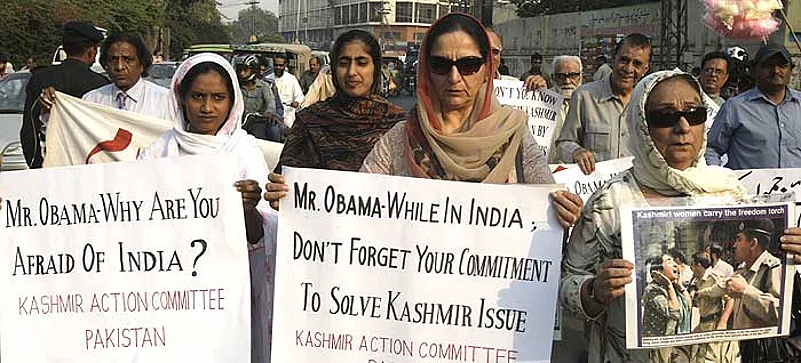It’s rare to have a political event that packs enough punch to attract as many eyeballs as an Indo-Pak cricket match. Last week, though, as American President Barack Obama and his wife Michelle winged their way to Mumbai and then New Delhi, Pakistanis remained glued to TV, watching animatedly an event that should have ideally been titled ‘2010: A Love Story’. People gasped in disbelief, their eyes rolling, as they saw the world’s most powerful man and his wife shake their legs and hips, in good ol’ Bollywood style, amidst cheering children. Fetching the scene sure was, even touching—and it didn’t seem to matter that they were foot-tapping away next door in India.
But their endearing dance must have seemed like gyrations from netherworld to officials in the foreign office, for around the same time on November 6, the new American ambassador, Cameron Munter, informed foreign secretary Salman Bashir what the world was to hear 48 hours later—America would support India’s quest to become a permanent member of the UN Security Council (UNSC). Official Pakistan was shattered.
The American decision wasn’t only perceived as inherently unjust, but also fraught with serious consequences for the future. Additional secretary in the foreign office, Basit Ali, was to later say, “Such support for India’s inclusion as a permanent member in the UNSC adds to the complexity of the process of reforms of the council and contradicts the fundamental principles of the UN charter. There are reasons enough to discredit India in relation to its neighbours, and for its continued flagrant violations of Security Council resolutions on Jammu and Kashmir.”
True, the promised seat for India is in the distant future, as is also the reform of the UNSC. But the symbolism of this decision is telling for, at one stroke, admit officials, Pakistan stands marginalised in global politics and now possesses no cards to play in the world arena. They also point to Pakistan’s perennial weakness: unlike New Delhi, Islamabad does not have the capacity to pursue an “issue relentlessly and gets sidetracked easily”.
For 48 hours, Pakistani officials mulled the news in silent secrecy, but when Obama announced the mind-altering decision to cheering Indian parliamentarians, TV channels here went ballistic—every talk show, every current affairs programme, had discussions analysing threadbare the consequences of a UNSC seat for India. Their verdict was near-unanimous: the American decision had come at a time when India had become a bully of the region; and two, the inclusion of India in the UNSC would make it, as one participant put it, “less capable of acting in crises needing immediate collective response—something like (its precursor) the League of Nations.” On November 10, the Pakistan cabinet said the US move had “grave ramifications” for multilateral cooperations and implications for peace in South Asia.
Analysts feel the US decision has imparted legitimacy to the flawed nation-state that India is. As security analyst Dr Shireen Mazari says, “The US has effectively endorsed India’s terrorism in Kashmir and its contravention of UNSC resolutions, not really expected of a state seeking to become a permanent member of the UNSC. It’s a mockery of the UN which, in the post-bipolar world, has become a bit of a bad joke on issues of peace and security. Its primary function now is to allow the US to abuse the UN for its own purposes.” Referring to Obama’s speech in which he supported a permanent UNSC seat for India and also talked of human rights in the same breath, Basit told Outlook, “These words will ring hollow if India continues to refuse to implement UNSC resolutions on Kashmir and trample over the legitimate rights of Kashmiris. Fine words butter no parsnips.”
It’s debatable whether Washington will ever get unduly worried about India’s human rights record or its contravention of UNSC resolutions. Obama the president is anyway a shadow of Obama the campaigner—before he shifted into the White House, he had counted the resolution of the Kashmir problem among his primary tasks. Now, nearly 22 months later, he decides to remember, of all things, the human rights abuses in Myanmar. Says Pakistan Muslim League (Nawaz) leader Syed Mushahid Hussain, “We are disappointed, shocked. Obama takes note of the incarcerated Chinese dissident who was awarded the Nobel Peace Prize, but he has nothing to say for the thousands of Kashmiris who are not only being denied their right to self-determination but are being brutalised by state terrorism.” Agrees former ambassador Shahid M. Amin, “Kashmiris will be disappointed by Obama’s failure to refer to the violation of human rights even though it has witnessed unprecedented demonstrations for the past several months. Obama’s praise for India’s high moral values sounds hollow.”
It’s true the American seem to have bestowed unprecedented status on India, quite evident from the global partnership the two are to forge in Afghanistan and Africa. This has raised the sceptre here of New Delhi outmanoeuvering Islamabad in Kabul. But, really, can this goal be achieved by India through a joint partnership with the US in fields such as capacity building, women’s empowerment and agriculture in Afghanistan, where the power truly flows from the barrel of the gun? Pakistan People’s Party leader Sherry Rehman scoffs at such fears: “The key to success in Afghanistan lies with Pakistan. From Kandahar to Kabul, it’s Pakistan which will provide the answers. No solution in Afghanistan is complete without Pakistan. We hold all the keys.”
It isn’t an empty boast. There are certain geopolitical realities that no Indo-US love fest can overcome. When NATO forces struck inside Pakistan a few weeks ago, Islamabad closed the Torkham border through which NATO supplies pass. The supplies were resumed only after NATO’s unequivocal apologies. Again, America is crucially dependent on Islamabad for ‘facilitating’ talks between the Taliban and the Karzai government. The possible Talibanish face of the future regime in Kabul is precisely what has thrown India into a tizzy. And though New Delhi is said to have been keen on training the Afghan army, Obama at least ignored India’s overtures on this count. An Afghan army trained by the Indians would have been anathema for Pakistan. Military chief Gen Ashfaq Parvez Kayani has made it clear to the NATO that he will under no circumstance countenance an Afghan security force with an “Indian mind”. For Pakistan, this was the saving grace of Obama’s visit to India.
Disappointed, some even drew comfort from Obama’s talk of a stable Pakistan being in India and the world’s interest. Such are the straws Pakistanis seek to grasp as Obama seems all set to reorder the region to his, and should we say, India’s imagination.





















